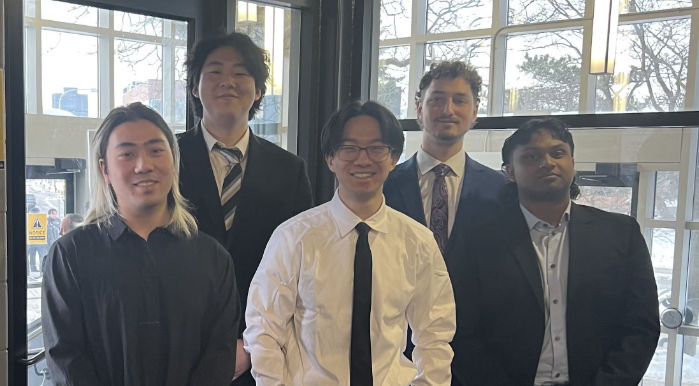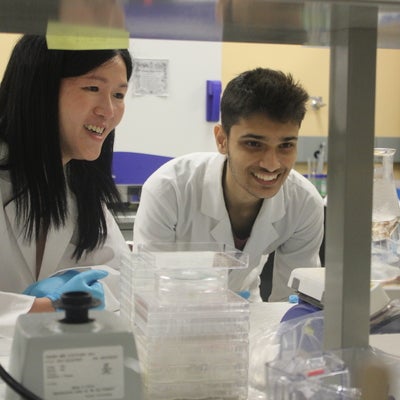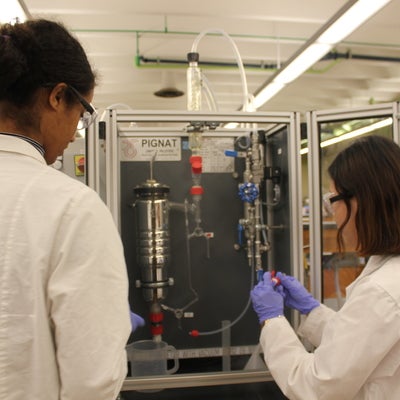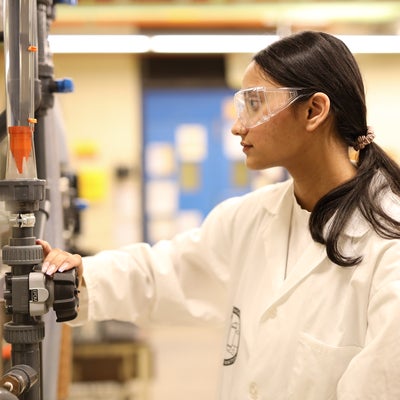Why Chemical Engineering?
Chemical Engineering deals with the transformation of energy and raw materials into products the world relies upon. In doing so, chemical engineers integrate principles of math, physics, chemistry, and biology. They are responsible for creating global solutions to a wide range of industrial, environmental and societal problems in safe, sustainable and energy-efficient ways. Whether you’re creating the next generation of life-saving pharmaceuticals, cybernetic systems or alternative energy, as a chemical engineer you’ll be contributing to the betterment of society.
In one of the world's top Chemical Engineering programs, you’ll develop your creativity and problem-solving skills in state-of-the-art laboratories. You’ll also design, control, and optimize physical and chemical processes. Upon graduation, you'll be ready for a career in renewable energy, electrochemical systems, agriculture and food processing, biotechnology and the biomedical industry, pharmaceuticals, environmental protection, and restoration, and more.
Courses in Chemical Engineering
In first year, you'll take a mix of engineering, math, biology, chemistry and physics courses. After first year, most of your classes will be Chemical Engineering courses. You'll learn to design batteries, optimize and control chemical and biological processes and design separation processes.
Sample first-year courses
This is a sample schedule. Courses are subject to change.
| 1A Term | 1B Term |
|---|---|
Upper year courses
For information about courses past your first year, check out the Undergraduate Academic Calendar.
Customize your degree with options and specializations
Options
Options are a way to provide you with a path to expand your degree and get a secondary emphasis in another subject or area. Students should decide if they are interested in taking options as they enter second year. Some available options are:
Specializations
A specialization is recognition of selected elective courses within your degree. Specialization offerings are unique to your engineering program and are listed on your diploma. Specializations that are available to Chemical Engineering students include:
Computers & chemical engineering
Do you enjoy working with computers?
If so, you might be excited to learn that programming, AI, machine learning, simulations, and automation play a pivotal role in chemical engineering, particularly in developing sustainable processes.
For example, how can we produce clothes, food, energy and fuels in ways that are environmentally friendly? Computational tools and AI are at the heart of designing solutions to these challenges.
As a chemical engineering student, you'll gain the skills to apply these technologies to real-world problems, creating a meaningful impact on society and the planet.
Our department excels in Process Systems Engineering—a field where researchers leverage computational tools to design, optimize and control advanced processes.
In your undergraduate studies, you can choose the Chemical Process Modeling, Optimization, and Control specialization if you're interested in using computers to tackle complex challenges and innovate for a better future.
Co-op for Chemical Engineering students
You’ll have an unrivalled opportunity to gain paid work experience before you even graduate. We’ll help you navigate job applications, résumés, and interviews; you’ll have the added benefit of trying out different roles and/or industries to find the one that fits you while building your work experience and reinforcing your in-class learning out in the real world. It all adds up to a competitive advantage after graduation.
Starting in first year, you'll normally alternate between school and work every four months, integrating your classroom learning with real-world experience. You can return to the same employer for a couple of work terms to gain greater knowledge and responsibility or work for different employers to get a broad range of experience.
Your first work term will be halfway through first year
| Year | September to December (Fall) | January to April (Winter) | May to August (Spring) |
|---|---|---|---|
| First | Study | Co-op | Study |
| Second | Co-op | Study | Co-op |
| Third | Study | Co-op | Study |
| Fourth | Study | Co-op | Co-op |
| Fifth | Study | Study | - |
or at the end of first year
| Year | September to December (Fall) | January to April (Winter) | May to August (Spring) |
|---|---|---|---|
| First | Study | Study | Co-op |
| Second | Study | Co-op | Study |
| Third | Co-op | Study | Co-op |
| Fourth | Co-op | Study | Co-op |
| Fifth | Study | Study | - |
There are two options for co-op sequences. You can request your preference if you receive an offer of admission. Learn more about co-op.
Example co-op positions for Chemical Engineering students
- Supply chain assistant
- Research assistant
- Data analyst
- Product execution specialist
- Reliability engineer
- Materials scientist
- Production coordinator
- Process specialist
- Quality project coordinator
- Process analyst
Working remotely across time zones
Anand Nair, Chemical Engineering student
Anand, a third-year Chemical Engineering student, shares what it was like working and completing courses remotely, all in a different time zone.
He shared "One of the most important things that I learned, and I think builds cumulatively over time, is the ability to ask questions and not shy away from them, even when you don’t understand anything. It helps you think outside the box and come up with alternative solutions. Because the entire point of having a co-op student work with you is you get a fresh set of eyes on the same problem that you've been dealing with. No employer would say no to asking a question and they will really appreciate your genuine interest in the work that you're doing.”

Example careers for Chemical Engineering graduates
- Test systems engineer
- Process specialist
- Supply chain analyst
- Associate project manager
- Production engineer
- Patent lawyer
- Design engineer
- Materials engineer
- Environmental consultant
- Sustainability engineer
- Project manager
- Chemical research scientist

Capstone design projects in Chemical Engineering
Capstone Design is the culmination of the engineering undergraduate student experience, creating a blueprint for innovation in engineering design.
Supported by numerous awards, Capstone Design provides Waterloo Engineering students with the unique opportunity to conceptualize and design a project related to their chosen discipline.
A requirement for completion of their degrees, Capstone Design challenges students teams to push their own boundaries, and apply the knowledge and skills learned in the classroom and on co-op work terms. It reinforces the concepts of teamwork, project management, research and development.
For a full list of previous capstone design projects, see our Capstone Design website.
Breaking Down Barriers: Bioengineering Pathways to Dissolve Plastics (Capstone 2025)

Ibitayo Adeyemo, Danielle Downes, Zahra Eudoxie, Vaishala Thirugnansampanthar
With Canada generating over 3.3 million tonnes of plastic waste annually and only 9% being recycled, sustainable plastic alternatives are essential. Our project utilizes the bacterium Cupriavidus necator to convert plastic-derived feedstocks into Polyhydroxybutyrate (PHB), a biodegradable plastic. We assess PHB production's scalability, economic feasibility, and environmental benefits by integrating Flux Balance Analysis (FBA) for metabolic optimization and SuperPro Designer for industrial simulation. This innovative approach aims to reduce plastic waste, cut greenhouse gas emissions, and support Canada’s circular economy through viable, cost-effective industrial implementation.
SmartDose (Capstone 2025)

Ethan Coutinho, Max Freudenthaler Galvan, Matthew Liu, Huffington Xu, Ray Xu
SmartDose is a next-generation epinephrine injector designed to enhance emergency drug delivery. Unlike traditional EpiPens, it features biometric authentication and a modular design, allowing for easy needle and vial replacement. By improving accessibility, reducing waste, and ensuring precise dosing, SmartDose offers a cost-effective, reusable alternative for anaphylaxis treatment.
Student design teams
The Sedra Student Design Centre consists of over 20,000 square feet of space dedicated to design teams and student projects. There are more than two dozen design teams, all of which are student-led, and many of which represent Waterloo internationally.
Some examples include:
International Genetically Engineered Machine (iGEM) team

The goal of the Waterloo iGEM team is to engineer biological processes like electrical and software systems, rewiring naturally-occurring genetic components using principles from synthetic biology.
Formula Nano

Formula Nano is dedicated to designing, building, and racing molecular machines at the nanoscale. We're working towards competing in the next international Nanocar Race where teams compete to race single molecules using a specialized scanning tunneling microscope.
Alternative Protein Project

The Waterloo Alternative Protein Project is the first chapter of the Good Food Institute’s Alt. Protein Project in Canada. The project aims to create a sustainable and secure food system through research, entrepreneurship, and innovation.
Chemical Engineering alumni
Kayli Dale & Jacqueline Hutchings

Kayli and Jacqueline (class of 2020) made the Forbes Magazine’s 30 Under 30 list for 2023. The pair are the co-founders of Friendlier, a company dedicated to eradicating single-use plastics in food businesses.
Read more about Kayli and Jacqueline's story.
Kartik Subramanian

Kartik (class of 1998) "I chose to study Chemical Engineering at the University of Waterloo because I wanted to study a discipline of engineering that related to food, energy, advanced materials, and medicine".
Read more about Kartik's time in Chemical Engineering.
Sarah Vandaiyar

Sarah (class of 2009), "I think the co-op program is probably one of the best opportunities an undergrad can have. It gives you real-world experience, teaches you how to interact with people in the workplace and gives you great connections for after you graduate".
Read more about Sarah's time in Chemical Engineering.
Daniel Tuana

Daniel (class of 2020), "I aim to leverage my unique insight stemming from my chemical engineering degree and manufacturing experience to help commercialize the most promising new nuclear technologies”.
Read more about Daniel's time in Chemical Engineering.






